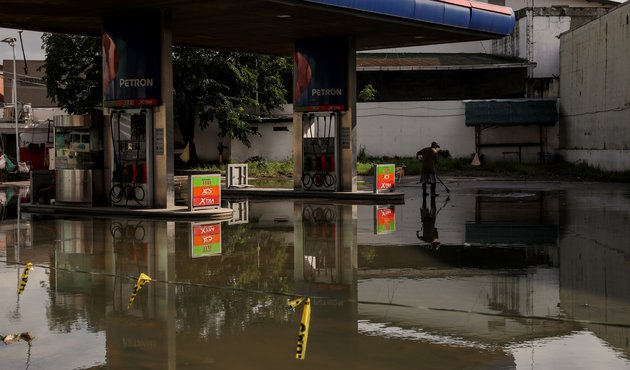The fossil fuel industry has made a fortune from offloading the environmental costs of its products onto people for decades. As deadly storms, heatwaves and wildfires become more frequent, intense and costly, a rebalancing of the scales is needed.
People are feeling the devastating impacts of the climate crisis across the globe. Despite being least responsible, poorer communities are picking up the costs.
Money pledged to the UN Loss and Damage Fund by wealthy nations pales in comparison to what’s needed and the burden is falling squarely on taxpayers.
At the same time, the oil industry most responsible for the crisis is making billions in profits yet contributing nothing.
The UK government’s manifesto pledge to support countries at the forefront of climate breakdown is warmly welcome. However, financial commitments to the Loss and Damage Fund, including from the UK, currently fall woefully short of what’s required.
The UK government should explore measures that would require the oil industry to contribute its fair share to the Loss and Damage Fund, while helping to secure green investment and green jobs within the UK.
Download the full policy briefing : UK oil industry contributions to climate action
Download ResourceThe oil industry’s role in loss and damage
At the COP27 summit in 2022, governments made a historic agreement to set up a Loss and Damage Fund to support poorer nations with the costs of climate destruction.
Yet initial pledges for the fund come to less than 0.2% of the annual cost of climate damages in developing countries, which is estimated to be upwards of £304 billion per year.
Clearly wealthy nations need to do more, but this shouldn’t be at the expense of struggling taxpayers. Innovative sources of revenue will be needed to get anywhere near to the levels of support needed.
Governments around the world, from the US to Kenya to EU member states, are looking at new ways to fill this funding gap, including by contributions from the fossil fuel industry.
Oil companies should be contributing to these costs, and the UK industry has a responsibility to play a leading role in these efforts.
Global Witness analysis shows that the five major fossil fuel companies – BP, Shell, TotalEnergies, ExxonMobil and Chevron – made £93 billion profits in 2023 – more than the combined GDP of the 11 poorest countries most threatened by the climate crisis.
While the oil industry counts its astronomical earnings, households are counting the cost of its planet-heating pollution. Whether it’s through government spending or coming straight from people’s pockets, communities in the UK and overseas are picking up the tab for carbon-driven destruction.
Beyond boosting international loss and damage funding, the UK’s oil industry could also be made to pay for the energy transition at home – including a properly funded plan to support oil workers shift to green jobs.
Recommendations for the UK government
The UK government has shown it is willing to take on vested interests in the tobacco and junk food industries. It can now do so in championing loss and damage on the global stage.
Given the lack of accountability for oil companies’ climate impacts and the severe shortfall in climate financing, the government has an opportunity to show it can stand up to fossil fuel interests and fulfil its climate pledges to communities at home and overseas.
This policy briefing sets out a case for the UK requiring oil and gas producing companies to contribute to the Loss and Damage Fund, including two example policy proposals.
Climate Superfunds
The Polluters’ Pay Climate Fund Bill was introduced in Congress in September 2024 and holds that fossil fuel companies would contribute annual fees to a $1 trillion federal Superfund over 10 years, in proportion to their share of global emissions.
The income would be invested in climate projects across the US, including to cover loss and damage costs, with 40% of the funds reserved for environmental justice communities.
The Climate Damages Tax
Instead of being based on historic emissions, this model would collect payments based on emissions from ongoing oil extraction that would increase over time.
Revenues raised would be split between the international Loss and Damage Fund and domestic climate action projects. Analysis by Global Witness shows that if implemented in the UK, the Climate Damages Tax would raise a cumulative £20 billion within 10 years.
Global Witness calls on the UK government to review options for measures that would:
- Raise additional revenue for the Loss and Damage Fund by requiring oil producing companies to contribute
- Include a domestic dividend to support communities and workers to transition to green industries
- Be additional to other sources of financing for climate action and a just energy transition plan
Download the full policy briefing : UK oil industry contributions to climate action
Download Resource

